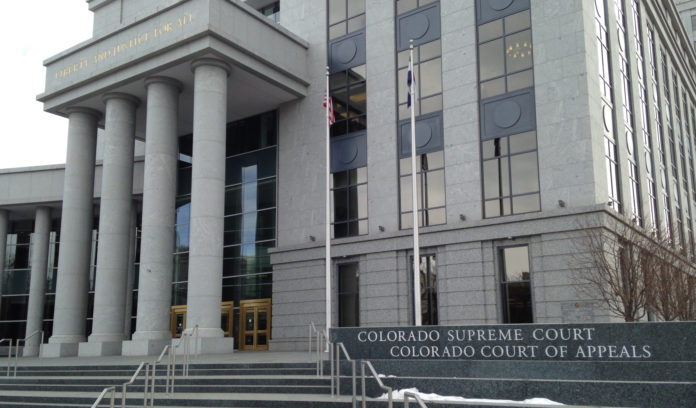
COVID-19 has caused many issues throughout the country, and now it’s at the forefront of oral arguments at the Colorado Supreme Court.
Four similar cases will be heard Jan. 11, which are all connected to property taxes and COVID-19 regulations. All of the cases jumped from the Colorado Court of Appeals right into the state Supreme Court before a decision was made. Parties for the different cases include those from Larimer, Douglas, Jefferson and Broomfield counties.
According to a jurisdiction motion from the Colorado Court of Appeals in the Larimer County case, these are four of many cases filed throughout the state where commercial property owners wanted revaluations for the 2020 tax year. The numerous property owners contended aspects of the COVID-19 pandemic, along with the resulting health orders, were unusual conditions requiring revaluation under Colorado Revised Statute 39-1-104(11)(b)(I).
The jurisdiction motion asserted five issues of law:
- Whether assessors needed to consider unusual conditions arising after Jan. 1, 2020.
- If executive and public health orders issued were new regulations that restricted land use and therefore, were unusual conditions.
- Whether COVID-19 was a detrimental act of nature.
- Whether property owners needed to show alleged unusual conditions caused a change in value to their properties to trigger the assessors’ duties to revalue the properties.
- Whether even if a taxpayer shows unusual conditions impacted the value of the property, the assessor keeps the discretion to decline to revalue the property.
The Colorado Court of Appeals suggested these are important questions that should be determined by the Colorado Supreme Court. The appeals court added a conclusion could result in tax refunds.
In the case out of Larimer County, according to an appeals court opening brief from the Larimer County Board of Equalization and Larimer County Assessor, the landowners disagreed with the assessor’s valuation of their properties and protested to the assessor contending the assessed values weren’t correct due to an alleged unusual condition – executive and public health orders connected to COVID-19. The assessor denied it believing the original assessments were correct, and it was affirmed by the county’s equalization board.
The landowners filed a complaint in district court claiming the assessor’s values were incorrect. In a summary judgment, the district court ruled the executive/public health order constituted an unusual condition because they regulate land use. In the opening brief, Larimer County governmental parties argued this was in error because there weren’t facts asserted or findings entered that demonstrated the orders regulated the use of land.
The county argued the executive/public health orders were issued after Jan. 1, 2020, which is the deadline for the assessor to determine the value of all properties for the 2020 tax year. The landowners asserted the Jan. 1 deadline doesn’t apply to unusual conditions, but the county argued that assertion is contrary to the biennial tax year process. During that process, according to the opening brief, the assessor is limited to data and information from six to 18 months prior to the beginning of the base year, which would be 2019 in this case.
On appeal, the county had asked the appeals court to reverse the district court’s rulings and to dismiss the case.
One of the questions for the Colorado Supreme Court, in this case, is whether the district court erred in concluding under 39-1-104(11)(b)(I), an assessor must take into consideration unusual conditions occurring after the assessment date of Jan. 1, 2020, for valuation for the 2020 tax year.
Another question before the Colorado Supreme Court in that case is whether the district court erred in concluding the executive and public health orders are regulations on the use of land and are an unusual condition.
In the case involving the Douglas County assessor and board of equalization, the taxpayers’ opening brief said they timely filed assessment appeals to the assessor, and once it was denied there, it was sent to the board of equalization, requesting a revaluation of their properties for the 2020 tax year because of unusual conditions. After being denied again, the taxpayers filed suit, hoping to have the district court compel the assessor to revalue the properties. The complaint referred to the COVID-19 orders, which they argued, restricted the use of their properties.
The district court granted the county its motion to dismiss. The taxpayers argued the district court misinterpreted the plain language of the statute and erroneously found the taxpayers weren’t entitled to any relief because 39-1-104(11)(b)(I) permitted, but didn’t require, the county to consider unusual conditions which occurred during intervening years. The brief further surmised the county wasn’t required to revalue taxpayers’ properties if unusual conditions occurred during either intervening year.
According to the brief, the district court further concluded that the county was required to revalue taxpayers’ properties if unusual conditions existed during the base period, which in this case, for the 2020 tax year, would be from Jan. 1, 2017-June 30, 2018. Since the orders didn’t occur until 2020, the county didn’t have a duty to revalue the taxpayers properties, according to the court. The taxpayers appealed the district court’s order to reverse the motion to dismiss.
One of the questions before the Colorado Supreme Court in this case deals with whether the district court erred in finding under 39-1-104(11)(b)(I) the defendants had the discretion but weren’t obligated to revalue taxpayers’ properties for the tax year 2020 based upon the unusual conditions occurring that year.
Another question for the Colorado Supreme Court in the case was whether the district court erred in finding under 39-1-104(11)(b)(I) any unusual condition that requires revaluation would have to arise during the base period for which the level of value was determined during the tax year in question.
The cases from the other counties contain similar questions. For a full list of the cases and questions, check here.

